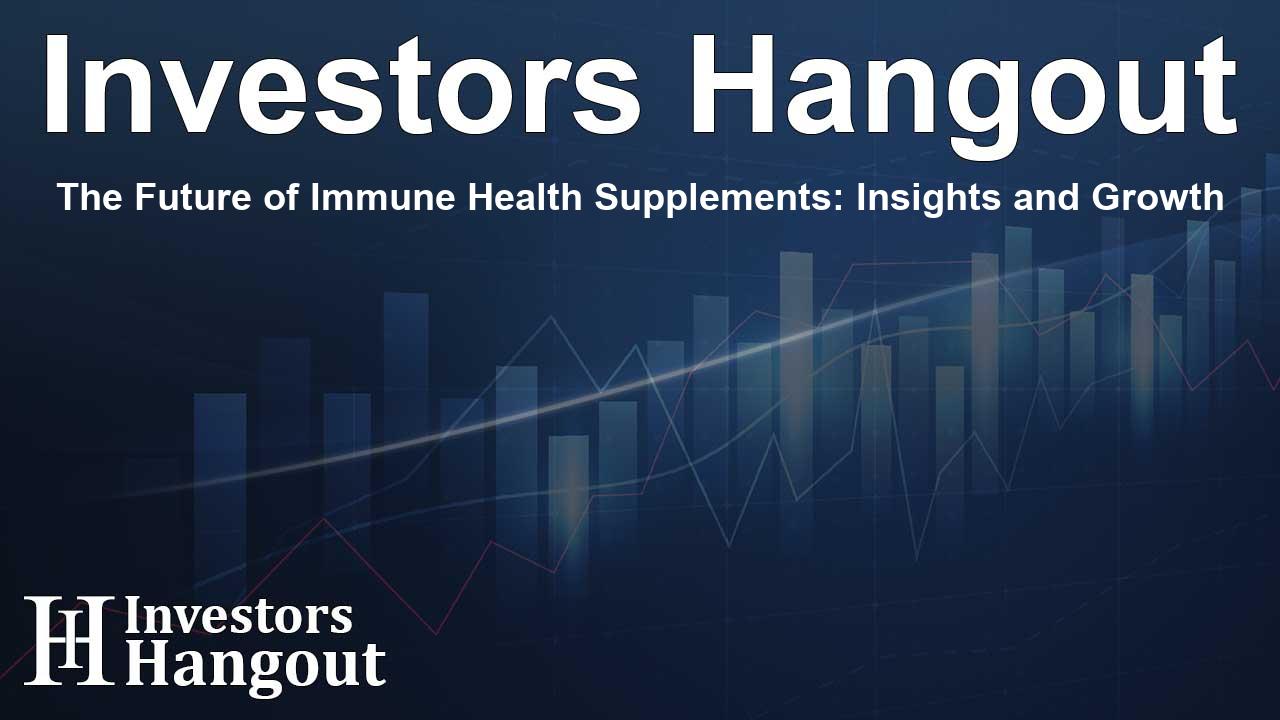The Future of Immune Health Supplements: Insights and Growth

Understanding the Immune Health Supplements Market
The immune health supplements market is experiencing significant growth, currently valued at approximately USD 25.3 billion in the recent past. This sector is expected to witness a robust expansion, reaching an estimated USD 58 billion by the end of the next decade. The annual growth rate for this market is projected at a commendable CAGR of 9.8% from 2024 to 2032. These supplements, vital for maintaining immune health, offer various vitamins, minerals, and herbal ingredients that enhance immune function and overall well-being.
Factors Driving Market Growth
Several factors are propelling the growth of the immune health supplements market. The increasing incidence of chronic diseases is a significant driver, as more people seek ways to bolster their immune defenses. Chronic conditions often lead individuals to pursue healthier lifestyles, highlighting the need for effective immune support. Additionally, the growing awareness surrounding health and wellness, especially among older adults, has further contributed to this trend. As the elderly tend to have weakened immune systems, many are turning to supplements as a proactive approach to health maintenance.
Innovation in Supplement Formulations
Innovative advancements in supplement formulations are at the forefront of market expansion. These innovations have led to more focused and effective products that meet the needs of consumers seeking immune support. From enhanced bioavailability in capsules to targeted release mechanisms, these developments position immune health supplements as foundational elements in modern healthcare practices.
Segmentation of the Market
The immune health supplements market comprises several segments based on product types. These include vitamins, minerals, herbal supplements, probiotics, and more. Among these, the vitamins category, valued at USD 7.3 billion, has emerged as the largest segment and shows promise for continued growth. Key vitamins, such as A, C, D, and E, are recognized for their essential roles in immune function, leading to heightened demand.
Formulation Types and Market Shares
Another aspect of segmentation within this market relates to product formulation, which includes capsules, tablets, powders, and liquids. Notably, capsules dominated the market, holding a 34.2% share as of last year due to their convenience and enhanced nutrient absorption. Certain formulations are tailored for specific release times, maximizing the effectiveness of the active components as they journey through the digestive tract.
Regional Insights and Forecast
When evaluating the geographical distribution of the immune health supplements market, North America stands out as the leading region, projected to reach a significant USD 23.2 billion by the end of the forecast period. The United States alone contributed USD 9.4 billion to this total last year, propelled by a high prevalence of chronic diseases like diabetes and cancer. This region's strict regulatory environment ensures the safety and efficacy of the products available, further reassuring consumers and boosting market confidence.
Key Players in the Market
The competitive landscape within the immune health supplements market features a mix of prominent players such as Abbott Laboratories, Herbalife Nutrition, and Cargill, among others. These companies are continually innovating their product offerings and expanding their market reach to cater to the rising consumer demand for effective immune support.
Conclusion and Future Prospects
The future of the immune health supplements market looks promising, supported by a strong demand for products that enhance health and well-being. As innovation continues and consumer awareness rises, businesses operating in this sphere are well-positioned for sustainable growth. For stakeholders, understanding these trends will be crucial for capitalizing on market opportunities ahead.
Frequently Asked Questions
What is the projected market size for immune health supplements?
The immune health supplements market is projected to reach approximately USD 58 billion by 2032.
What factors are driving the demand for immune health supplements?
The rise in chronic diseases and increased health consciousness, particularly among older adults, are significant factors contributing to the demand.
Which product types are leading the immune health supplements market?
Vitamins, especially A, C, D, and E, dominate the market, with significant demand for other supplements such as probiotics and herbal products.
Where is the largest market for immune health supplements located?
North America is currently the largest market for immune health supplements, with the U.S. contributing the most revenue.
Who are the main competitors in the immune health supplements industry?
Key players include Abbott Laboratories, Amway, Herbalife Nutrition, and Nestlé among others.
About Investors Hangout
Investors Hangout is a leading online stock forum for financial discussion and learning, offering a wide range of free tools and resources. It draws in traders of all levels, who exchange market knowledge, investigate trading tactics, and keep an eye on industry developments in real time. Featuring financial articles, stock message boards, quotes, charts, company profiles, and live news updates. Through cooperative learning and a wealth of informational resources, it helps users from novices creating their first portfolios to experts honing their techniques. Join Investors Hangout today: https://investorshangout.com/
Disclaimer: The content of this article is solely for general informational purposes only; it does not represent legal, financial, or investment advice. Investors Hangout does not offer financial advice; the author is not a licensed financial advisor. Consult a qualified advisor before making any financial or investment decisions based on this article. The author's interpretation of publicly available data shapes the opinions presented here; as a result, they should not be taken as advice to purchase, sell, or hold any securities mentioned or any other investments. The author does not guarantee the accuracy, completeness, or timeliness of any material, providing it "as is." Information and market conditions may change; past performance is not indicative of future outcomes. If any of the material offered here is inaccurate, please contact us for corrections.